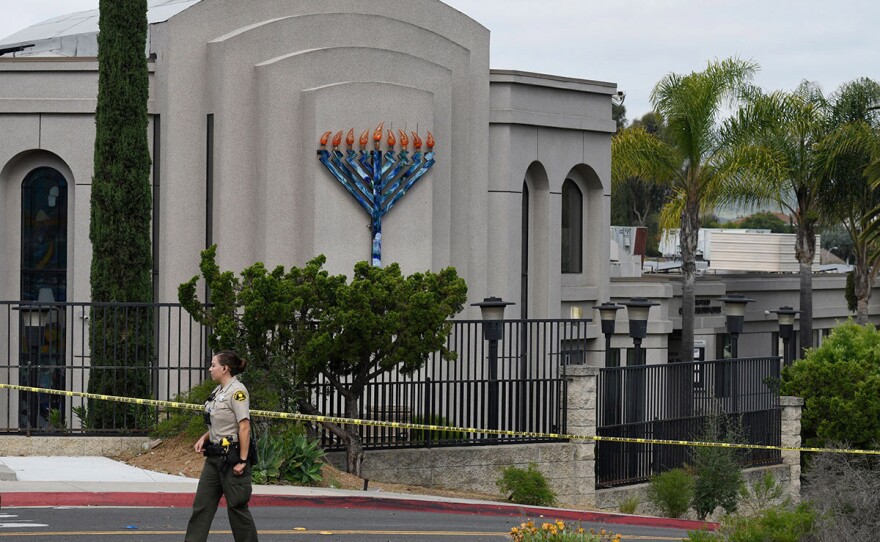In the aftermath of the shooting at the Chabad of Poway synagogue, questions have been raised about what could have been done to prevent the attack.
San Diego Sheriff Bill Gore told reporters his department was reviewing a "manifesto" allegedly posted by the suspect on an online message board called 8chan. It's the same website that was allegedly used by a suspect charged with murdering 50 people at two mosques in New Zealand in March.
On the last day of Passover celebrations last month, a gunman entered a synagogue in Poway, opened fire and killed a 60-year-old woman. He injured three others, including a young girl. According to authorities, the suspected shooter had no criminal record and no prior interactions with law enforcement.
8chan says it welcomes users to the "darkest reaches of the internet" and promotes freedom of speech above all else. It is filled with neo-Nazi and anti-Semitic posts, and sometimes calls for violence against Jews and racial minorities.
Law enforcement officials say they face many challenges in monitoring potentially violent extremists online mainly because of the vastness of the internet and also because of the issue of First Amendment rights, making it hard to stop extremists from carrying out their plans.
FBI special agent Darrell Foxworth said many violent extremists nowadays are self-radicalized through the internet.
"They go on the internet and identify social media sites, chat rooms, things of that nature and they start ... digesting this internally," he said. "Then they find some reason to identify with these groups and take violent actions against others."
Foxworth said federal law enforcement agents will sometimes monitor chat rooms when they are involved in specific investigations.
RELATED: Poway Shooting Latest In Series Of Attacks On Places Of Worship
"Everything they do is based on the law, they're not going to break the law to enforce it," he said. "So they're going to make sure they have a court order or a lawful authority that's going to allow you to do that, and usually that means that you're going to have to be involved in some sort of intelligence collection or investigation."
That monitoring usually happens at the federal level. When a specific threat is identified, the agency involved in the investigation will pass that information on to their regional field offices, who then work in cooperation with a local law enforcement agency.
Lt. Shawn Takeuchi, a spokesman for the San Diego Police Department, said it is extremely difficult for local law enforcement to proactively monitor the internet for potential threats.
"Oftentimes we'll rely on our federal partners for that," he said. "With the internet, we don't know where that information is coming from. If that threat is made in another state and it's coming across state lines, then it's going to be very, very difficult for us to investigate."
Takeuchi said another challenge is identifying whether a threat on the internet is criminal and credible or if it could be protected by freedom of speech.
"We have the Bill of Rights and Freedom of Speech, so in this country we have the ability to say things that we want to say without fear of prosecution, without fear of government intervention," he said.
RELATED: Synagogue Shooting Suspect Pleads Not Guilty To Hate Crimes
The California Penal Code defines criminal threats as a willful threat to commit a crime that will result in death or bodily injury to another person. The threat can be made in writing, verbally or by electronic communication.
Mark Heckman, a cybersecurity professor at the University of San Diego, said those threats have become more difficult to track nowadays because of encryption services and private chat rooms. Extremists are constantly coming up with new methods of avoiding detection, he said, and law enforcement is constantly trying to counter those methods.
"Any tool that can be used for good can also be used for evil," he said.
Heckman added that finding a balance between monitoring the internet for public safety purposes and maintaining privacy is an ongoing debate.
"Perfect privacy and perfect security I think are both impossible," he said.
Federal authorities have charged the suspect in the Poway shootings with 109 counts of hate crimes including setting fire to a mosque in Escondido. He also faces state charges of murder and attempted murder.








